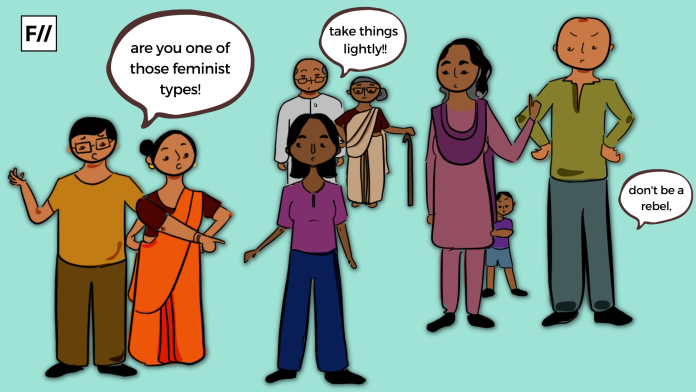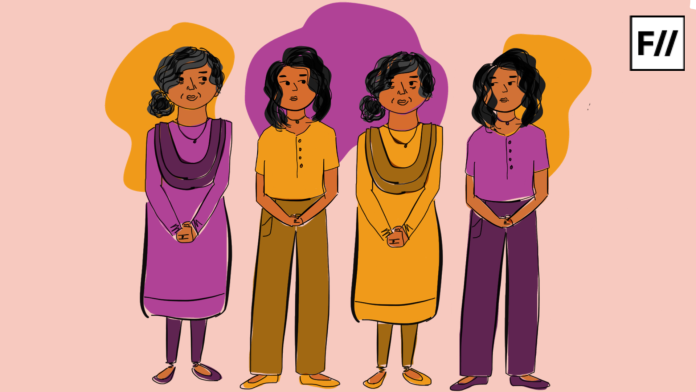We are often a society that seems to embrace modern values of individual agency and freedom. But the limits of what is sanctioned as acceptable is still decided by a complex mix of socio-moral factors. From ‘daughters from respectable households don’t do such things’ to ‘we don’t control our daughters, they can wear whatever they want to’, to ‘we’re very liberal, we let our daughters work’, how far has our society come in adopting a progressive attitude towards women? Is our ‘modernity’ reflected only through our clothes or does it also influence core values?
The dichotomy that has been established between the modern woman and the traditional woman is an indication of how the Indian society has conveniently adopted the ideas of modernity to suit its hypocrisy, instead of embracing progressive values that could lead to any real empowerment. Veronica and Meera, in the Hindi film Cocktail (2012) bring out this dichotomy very well.
Veronica (Deepika Padukone), an independent working woman living life on her terms, is juxtaposed with Meera (Diana Penty), a conventionally pretty woman portrayed as the angel of the house. The way Meera is seen as ‘marriage material’ by Gautam’s (Saif Ali Khan) mother and eventually Gautam, reveals a lot about the expectations placed by our society on their daughters-in-law.
“Society’s idea of a modern woman as the one who brings ‘extra’ income to the house while being ‘homely’ creates twice the pressure on women, where they are under constant fear of losing the tag of a ‘good’ mother in case of an imbalance in their professional and personal space”, says Swati Joshi, a Master’s scholar in Literature at Jamia Millia Islamia
Veronica is painted with strokes of selfishness and is almost villainised in the story, revealing how there is a certain amount of independence that our society can afford for women before they decide it’s ‘too much’. The question that arises here, then, is: do our families want their daughters, or women in general, to be independent?
The answer would be yes, as long as the independence of women does not threaten the existing socio-moral order. Women, hence, are allowed to be modern only until their idea of modernity is limited to ‘looking modern’ so to say. The moment they expect the men of the household to share the burden of household chores and raising children, they are deemed selfish and conveniently villainised.
On the list of things that immensely irk our society, an ambitious woman is placed quite high. Consequently, of course, women may work, but prioritising their career over taking care of their family is considered no less than self-centred behaviour, bordering on sin. For a woman, being independent, ambitious, driven, and speaking one’s mind while also having maternal or caregiving tendencies are still deemed mutually exclusive.
Also read: Feminism In A Sexist Household: Navigating Feminist Discourse With Conservative Parents

Herein comes the idea of “a modern woman rooted in tradition”. This “superwoman” character archetype is a working professional who manages to take care of the household as well as look after her children, all by herself. She’s simultaneously idealised as well as dehumanised by being put on a pedestal.
Perhaps it is high time we realise that performative modernity is not going to change our core attitudes and that the two-faced concept of modernity is eventually working to reinforce regressive patriarchal frameworks. The ultimate question that remains is whether we can drop our hypocritic expectations, go beyond superficial manifestations of modernity and embrace progressive values like agency and individuality or not
She’s glorified by society as an angel and is boasted about. She’s the standard that other women are compared to and should ideally aspire to. But perhaps what goes unasked here is the role of the men in the household. If the woman is expected to maintain a balance between her career and personal “duties”, how do we justify men prioritising their work over their family?
“Society’s idea of a modern woman as the one who brings ‘extra’ income to the house while being ‘homely’ creates twice the pressure on women, where they are under constant fear of losing the tag of a ‘good’ mother in case of an imbalance in their professional and personal space”, says Swati Joshi, a Master’s scholar in Literature at Jamia Millia Islamia.

While women live under the constant pressure to strike a balance, men get to walk away without even so much of a finger being pointed at them. Men are applauded for doing the bare minimum and for ‘helping’ in their households.
Perhaps it is high time we realise that performative modernity is not going to change our core attitudes and that the two-faced concept of modernity is eventually working to reinforce regressive patriarchal frameworks. The ultimate question that remains is whether we can drop our hypocritic expectations, go beyond superficial manifestations of modernity and embrace progressive values like agency and individuality or not.
It remains to be seen if ‘smash(ing) patriarchy!’ will be forever limited to merchandise and cool clothes, or really manifest into changed gender roles, equality and inclusion.
Also read: Sacred And Sinful: The Moral Policing Of Female Sexuality In Indian Households
Featured image source: Ritika Banerjee for Feminism In India
About the author(s)
Apoorva is currently pursuing her Master’s in English from Jamia Millia Islamia, New Delhi. When she’s not re-reading the letters by Virginia Woolf, she likes to try her hand at scribbling poetry. Her areas of interest revolve around Feminist Theory and Absurdist Fiction. She can be found brewing tea at midnight, complaining about our Sisyphean existence




